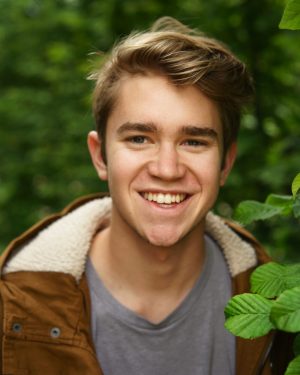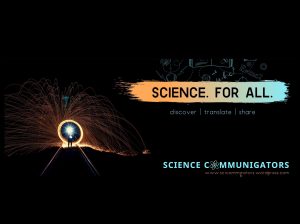PR and Physics Student Zack Savitsky Finds His Passion in Science Communication
By Madison Hindo, Public Relations 2020

When Zack Savitsky was applying to colleges, he was torn between his love for English and science. While he was trying to make a decision, he discovered the science communication community and realized the unique field would allow him to combine his passions. From then on, he was hooked.
Before the public relations junior, with minors in physics and Spanish, attended his first class at the University of Florida, he was already making connections and looking for ways to get involved with science communication. At his orientation session, he asked someone if they knew about anyone involved in the field and he was given Dr. Janice Krieger’s business card.
Krieger serves as the Director of the STEM Translational Communication Center at College of Journalism and Communications that focuses on translating science and health research for a wider audience. After he emailed her, she recommended that he stop by when he started at UF, and, within weeks of starting school, he was working on projects with the Center.
“That was definitely a kickstart to my interest and involvement in the field,” Savitsky said. “Dr. Krieger and the whole STEM Center team were really supportive of me taking initiative and choosing what I wanted to do in the field.”
Most of his first year was spent learning about the world of research, as well as what science and health communication research entailed. It involved a lot of qualitative coding, focus groups, interviews, and helping write papers. The first project team he worked on involved creating a virtual human doctor to help with colorectal cancer.
“I ultimately learned health communication isn’t exactly what I wanted to do, and I started to lean more toward hard science and research communication,” he said. “Then I applied for a grant and got funded to do a research project to learn how to provide better science communication opportunities to students at UF.”
Through the University of Florida Emerging Scholars Program, which provides research opportunities to freshman and sophomores, Savitsky researched creating a science communication certificate program. The experience taught him how hard it was for students to create curricula for other students. He now focuses on providing new opportunities and resources to students, hoping that this will eventually justify creating an academic program.
“I think the biggest impact I’ve been able to make so far is in talking to other professors and faculty members around campus and trying to start initiatives for it,” he said. “I think little by little we can get more students interested in taking science writing classes and learning more about the field of science communication.”
In his research project about making science communications more accessible, he argued that a program in the field would help UF research be publicized and consumed by a wider audience. It also would provide fresh perspectives by having students analyzing research. In addition to benefiting the University, he also believes it would benefit students by providing them opportunities in an increasingly prominent field.
“I think it’s really important that UF takes initiative and starts to offer opportunities for students here because there’s a big gap between the scientific community and the lay public,” Savitsky said. “It’s a gap that I am dedicated personally to bridging, and I want to show others why it’s important and what it entails to be that bridge.”.
 In April 2019, with support from the STEM Center, Savitsky founded Science Communigators, a student organization focused on making science communication resources and opportunities accessible to students. The organization holds workshops with professors and faculty members, creates YouTube videos about physics, and hopes to eventually travel to national conferences. Savitsky is also working to set up opportunities for club members to freelance for UF News and Explore magazine. Krieger and Dr. Kathryn McGill serve as faculty sponsors for the organization.
In April 2019, with support from the STEM Center, Savitsky founded Science Communigators, a student organization focused on making science communication resources and opportunities accessible to students. The organization holds workshops with professors and faculty members, creates YouTube videos about physics, and hopes to eventually travel to national conferences. Savitsky is also working to set up opportunities for club members to freelance for UF News and Explore magazine. Krieger and Dr. Kathryn McGill serve as faculty sponsors for the organization.
The organization has about 45 members, and it is open to students of all majors. Savitsky thinks it is important that opportunities like this are open to CJC students, as well as those pursuing STEM degrees, because both disciplines bring something important to the organization. While STEM students typically have more background on the scientific aspect of it, communications students know more about storytelling and engaging with the media.
In addition to classes, research and running a student organization, Savitsky is also a speaker coach for the TEDxUF conference. The role allows him to use his science communication skills to help STEM professors translate their work and communicate with a general audience.
After graduating, Savitsky plans to use his science communication skills as a science journalist. Eventually, he hopes to transition into high technology public relations.
“I think the fact that this a very large university and a research-driven university have totally opened up the door for me as an aspiring science communicator,” Savitsky said. “At another school, I don’t think I would have had the ability to pave this path.”
Category: Profiles, STEM Center News, Student News
Tagged: Science Communigators Zachary Savitsky Zack Savitsky
Subscribe to our News Digest


